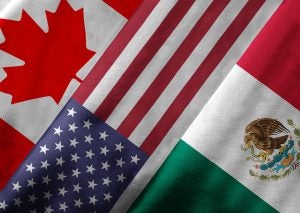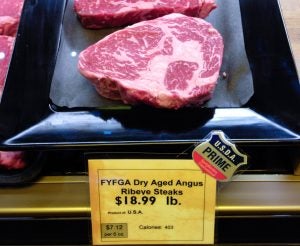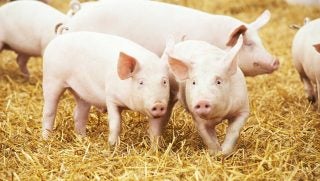U.S. cattlemen will soon again be divided on a controversial issue. For nearly two decades, varying politicians have been trying to establish a long-standing ruling regarding beef products: Mandatory Country of Origin Labeling (MCOOL). On Sept. 8, 2021 U.S Sens. Jon Tester (D-MT), John Thune (R-SD), Mike Rounds (R-SD), and Cory Booker (D-NJ) introduced new legislation that would again aim to mandate country of origin labeling for beef products. This new act, titled the American Beef Labeling Act, would amend the Agricultural Marketing Act of 1946.
Popular beef organizations have been divided on whether country of origin labeling should be mandated by the government or be a part of voluntary programs operated by the industry itself. MCOOL essentially requires products sold at retail — like in grocery stores, but not in restaurants — to verify and label products as “Product of United States” or “Born, raised, and processed in the US” or other similar phrases.
To the general eye, this probably seems like a positive attribute on a label. So why is it so controversial?
Well, the U.S. has tried to initiate MCOOL since the 2002 Farm Bill with a variety of methods. The first implementation was blocked because of the exuberant costs the verification process would incur for American cattle producers — and there was no evidence it would be returned at the sale point. In the 2008 Farm Bill, modifications were made to reduce costs associated with the verification process, and MCOOL was officially implemented in March 2009.

The start of MCOOL cued a massive global response, particularly upsetting trade with Canada and Mexico.
Both Canada and Mexico joined forces and established a dispute panel with the World Trade Organization in November 2009. The WTO helps facilitate imports and exports around the globe, contributing to our global trade market and trying to mitigate fair policies. The dispute panel was tasked with trying to “settle” the issues Canada and Mexico had with the United States’ MCOOL standards.
The U.S. neighbors stated that MCOOL violated trade agreements, in which imported product value was not to be diminished by legislative action. MCOOL has the slight premise of implying U.S. products are superior and therefore more valuable, whether this was the intended meaning or not. In short, the WTO ruled that the legislation needed to be modified or removed. So, in 2013 the U.S. modified MCOOL in an attempt to appease Canada and Mexico.
However, the dispute continued, and Canada/Mexico appealed to the WTO to initiate over $3 billion in retaliatory tariffs, of which $1 billion was approved. Therefore, the U.S. MCOOL was repealed in 2015, just three days before the tariffs would go into effect.
Because Canada and Mexico have not closed their dispute with the WTO, any enactment of a MCOOL program could result in the implication of those $1 billion in tariffs. Since Canada and Mexico are two of our top three trade partners, there is quite a bit of concern when it comes to legislation that could impact that.

A large issue with country of origin label is perception. Do we perceive U.S. products as superior to other countries? Maybe, but we also know that international food products are inspected and held to similar food safety/quality standards as U.S. products. So it may not necessarily be superiority, and more in relation to putting the American farmer first.
But, country of origin labeling is an industry issue that is not typically seen on the consumer end. Out of 12 attributes consumers look for in meat, a Kansas State University determined country of origin to be the 11th. Clearly, origin of food products is not a concern for consumers, and they likely won’t be willing to pay a premium for American products, especially as overall food costs rise.
So if MCOOL is not consumer driven, why are legislators so privy to instating the mandate?
A serious look needs to be had at what impacts — both positive and negative — MCOOL could have on the American beef system as well as other food products or industries in general. It is clear that little to no mandatory labeling of origin will satisfy our international trade partners, so at what cost are we willing to fracture those relationships?
Lastly, we must take a look at what legislators are attempting to implement these measures. For example, just recently, Booker introduced a bill titled the Farm System Reform Act, which would seriously impact our current agriculture system. Booker is a well-known vegan and has introduced or supported previous actions that could have had major impacts on animal agriculture. So why all of the sudden would someone like him be a friend to the American rancher?
If this legislation moves up the chain of command, it’s important we as an industry look more into what will be lost and what will be gained as a result, and make our decisions based on that. Until then, continue providing high quality, safe, wholesome food for the American people and the globe!
Michelle Miller, the Farm Babe, is a farmer, public speaker and writer who has worked for years with row crops, beef cattle, and sheep. She believes education is key in bridging the gap between farmers and consumers.



